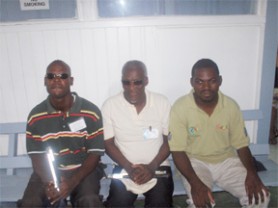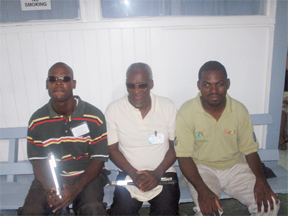-group desperately in need of office
Nine years ago Paul Cottom was a 31-year-old who was in the prime of his life with great plans to make life better for his family, including his young daughter, and to make his dream come through he worked two jobs.
But his life has taken a drastic turn because he went blind, and he is still struggling to come to terms with the fact that his eyesight is no more.
Previously he was an attendant at the Georgetown Public Hospital (GPHC) and when he was not there he was at home repairing gas stoves, bicycles and doing upholstery to make ends meet.
But today at the age of 40, Cottom is just living from day to day – he has lost his job, his family, his home and now lives with his mother but he’s desperate for stoves and fridges to fix.
He had undergone surgery for cataracts but still lost his sight and soon after he lost his job which he had for three years.
And even sadder he lost his family after he was forced to move out of the house he shared with the mother of his daughter “because she start disrespecting me when I get blind.”
“Now I live with me mother and I still does look after stoves and bikes even though I can’t see. I does try to make ends meet with the little I make and with the public assistance,” the man told Stabroek News in a recent interview.

Cottom does not want his nine-year-old daughter to experience what he has gone through and so he’s fighting to save her sight since she also has problems with her eyes.
The father of one said he is still adjusting to the fact that he is blind and he is grateful for the assistance he has received from the Guyana Association for the Visually Impaired.
“It was through the association that I get to meet many people like myself and this really help me,” the man said.
Unfortunately as Blindness Awareness Month is being observed the association noted that many persons who are visually impaired are facing grave financial problems and its members are crying out for assistance.
According to founding member and public relations officer of the association, Owren Case, the association is now operated out of the homes of its members as they were forced to give up their Thomas Street office due to the lack of finance.
He said initially the rent was $35,000 a month but that did not include other expenses and everything amounted to about $70,000 per month. The rent was subsequently increased to $60,000 and in September last year the association was forced to give up the office because they had no way of paying the rent.
$500,000 promise
Case said they had approached President Bharrat Jagdeo and were promised $500,000 to offset expenses they had at the time but two years later they are still waiting for the money and the association has no way of generating funds.
“We really need our own building, people are out there who need our help,” said 65-year-old Case, who has been blind for the past 11 years.
He himself had lost his job as a lab attendant at the University of Guyana when he went blind and he is appealing to employers not to send persons off the job medically unfit when they go blind.
“They could create a job for the person and not just throw them out because it is very traumatic when you lose your job and eyesight at the same time,” Case said.
Holding on to music
For 33-year-old Robert Weekes the situation has been a bit different because he is not totally blind and can see to move around.
He was born that way, he said, and from an early age he knew life would have been difficult for him and so he decided to hold on to music because of his love for the steel pan.
“I have talent when it comes to steel pan and with that and my public assistance I make do,” the man who is also physically challenged said.
He recalled his days at Christ Church Secondary School which were very difficult because of his inability to see to read and although he had the services of braille he was forced to depend on a female classmate who read whatever notes were given to him.
“But it was like when the girl didn’t come to school I didn’t go to school either because there was no one else to help me,” Weekes said, and eventually he had to leave school.
“But I keep holding on to my music…,” the young man said.
His music career began at the St Rose’s Unit for the Blind and later he joined the Multilateral School steel pan band and played in six national competitions. When the National Steel Orchestra was formed in 2008 following CARIFESTA, Weekes became a member and today he is the leader of the bass section.
Weekes is also a cricket lover and he is a member of the blind cricket team. The team is at present preparing for a tournament to be played in Barbados next month and Weekes said they are engaged in some intense training. Last year the tournament was held in Guyana and Jamaica won and according to Weekes his team’s performance would greatly improve if they can practice against another team.
However, it is hoped that they may soon have a practice match against an under-15 20/20 side.
He also echoed the plea by Case and Cottom for the association to have its own building.
Sit-a-ton
Meanwhile, according to Case, in observance of Blindness Awareness Month, which is being held under the theme ‘Changing the perception in minds towards the blind and visually impaired for 2010’, they have planned a number of activities.
One of the activities is two “sit-a-tons” they have planned to be held outside Nigel Supermarket and the City Mall.
“Instead of a walk-a-ton we will sit down and make as much noise as we can and hopefully we will get some much needed help,” Case said.
He said they have also written a number of companies seeking permission to tour their facilities but so far they have only received a response from one company which was not very promising.
“The company says because we are blind we would be endangering our lives by touring the facility but we do not agree.
I think by touring we can help the company to make the place safer for their employees because they would then see the dangers,” Case said.
The public relations officer also said that there are usually tour guides, “so just like how they tell the people with sight what they are seeing, why they can’t tell us the blind what they have and we will draw the picture in our minds.”
The association is also seeking donations from the companies they would have liked to tour.
“We really need the help, people are out there who need a place for us to meet and we need the assistance,” Case pleaded.

